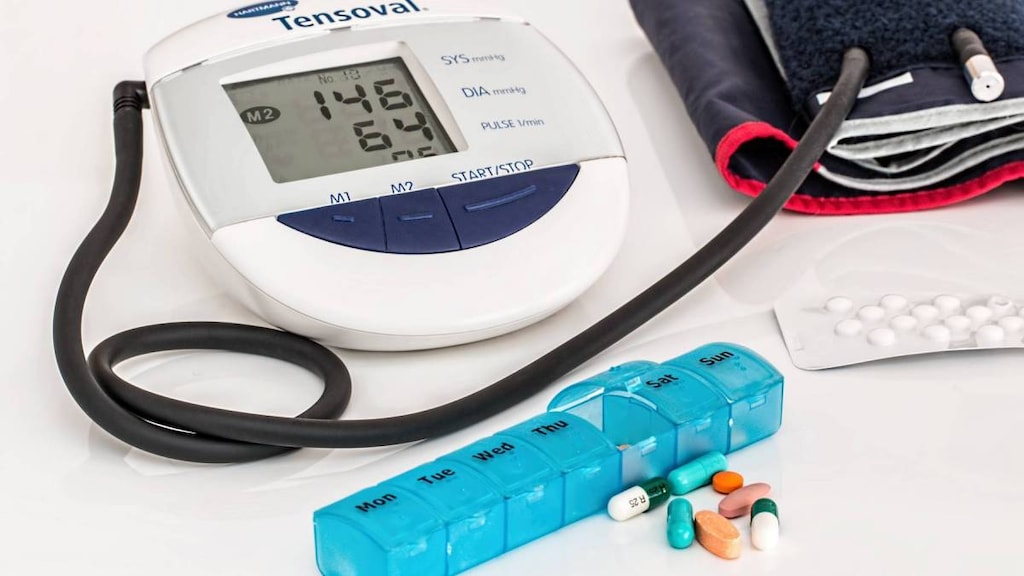Dosage Forms
Excipient information presented when available (limited, particularly for generics); consult specific product labeling. [DSC] = Discontinued product
Tablet, Oral, as hydrochloride:
Vecamyl: 2.5 mg
Pharmacology
Mechanism of Action
Mecamylamine inhibits acetylcholine at the autonomic ganglia, causing a decrease in blood pressure. The blood pressure lowering effect is predominantly orthostatic; the supine blood pressure is also significantly decreased.
Pharmacokinetics/Pharmacodynamics
Absorption
Almost complete
Excretion
Urine (unchanged); rate of elimination is significantly affected by the pH of the urine. Acidic urine promotes excretion; alkalinization reduces excretion
Onset of Action
0.5 to 2 hours
Duration of Action
6 to ≥12 hours
Use: Labeled Indications
Hypertension: Management of moderately severe to severe hypertension and in uncomplicated malignant hypertension.
Contraindications
Hypersensitivity to mecamylamine or any component of the formulation; mild, moderate, labile hypertension (may not be suitable for uncooperative patients); coronary insufficiency or recent myocardial infarction; uremia; glaucoma; organic pyloric stenosis; coadministration with antibiotics or sulfonamides
Dosage and Administration
Dosing: Adult
Hypertension: Oral: Initial: 2.5 mg twice daily; may increase by increments of 2.5 mg at intervals ≥2 days until desired blood pressure response is achieved; average dose: 25 mg/day (usually in 3 divided doses; range of 2 to 4 divided doses or more may be required). Note: A small dose and sometimes no dose at all, should be administered in the morning as the blood pressure response is heightened early in the day. The larger dose should be given at noontime or the evening.
Concomitant therapy: When coadministered with thiazide diuretics, decrease the dose of mecamylamine by ≥50%
Dosing: Geriatric
Refer to adult dosing.
Administration
Administration after meals may cause a more gradual absorption and smoother control of excessively high blood pressure. Timing of relationship to meals should be consistent.
Dietary Considerations
Take after meals. Concomitant use of alcohol may potentiate the effects of mecamylamine.
Storage
Store at 20°C to 25°C (68°F to 77°F); excursions are permitted between 15°C and 30°C (59°F and 86°F)
Drug Interactions
Alcohol (Ethyl): May enhance the adverse/toxic effect of Mecamylamine. Monitor therapy
Alfuzosin: May enhance the hypotensive effect of Blood Pressure Lowering Agents. Monitor therapy
Alkalinizing Agents: May increase the serum concentration of Mecamylamine. Monitor therapy
Amifostine: Blood Pressure Lowering Agents may enhance the hypotensive effect of Amifostine. Management: When amifostine is used at chemotherapy doses, blood pressure lowering medications should be withheld for 24 hours prior to amifostine administration. If blood pressure lowering therapy cannot be withheld, amifostine should not be administered. Consider therapy modification
Aminoglycosides: May enhance the neuromuscular-blocking effect of Mecamylamine. Avoid combination
Amphetamines: May diminish the antihypertensive effect of Antihypertensive Agents. Monitor therapy
Antipsychotic Agents (Second Generation [Atypical]): Blood Pressure Lowering Agents may enhance the hypotensive effect of Antipsychotic Agents (Second Generation [Atypical]). Monitor therapy
Barbiturates: May enhance the hypotensive effect of Blood Pressure Lowering Agents. Monitor therapy
Benperidol: May enhance the hypotensive effect of Blood Pressure Lowering Agents. Monitor therapy
Brigatinib: May diminish the antihypertensive effect of Antihypertensive Agents. Brigatinib may enhance the bradycardic effect of Antihypertensive Agents. Monitor therapy
Brimonidine (Topical): May enhance the hypotensive effect of Blood Pressure Lowering Agents. Monitor therapy
Bromperidol: Blood Pressure Lowering Agents may enhance the hypotensive effect of Bromperidol. Bromperidol may diminish the hypotensive effect of Blood Pressure Lowering Agents. Avoid combination
Capreomycin: May enhance the neuromuscular-blocking effect of Mecamylamine. Avoid combination
Colistimethate: May enhance the neuromuscular-blocking effect of Mecamylamine. Avoid combination
Dexmethylphenidate: May diminish the therapeutic effect of Antihypertensive Agents. Monitor therapy
Diazoxide: May enhance the hypotensive effect of Blood Pressure Lowering Agents. Monitor therapy
DULoxetine: Blood Pressure Lowering Agents may enhance the hypotensive effect of DULoxetine. Monitor therapy
Herbs (Hypertensive Properties): May diminish the antihypertensive effect of Antihypertensive Agents. Monitor therapy
Herbs (Hypotensive Properties): May enhance the hypotensive effect of Blood Pressure Lowering Agents. Monitor therapy
Hypotension-Associated Agents: Blood Pressure Lowering Agents may enhance the hypotensive effect of Hypotension-Associated Agents. Monitor therapy
Levodopa-Containing Products: Blood Pressure Lowering Agents may enhance the hypotensive effect of Levodopa-Containing Products. Monitor therapy
Lincosamide Antibiotics: May enhance the neuromuscular-blocking effect of Mecamylamine. Avoid combination
Lormetazepam: May enhance the hypotensive effect of Blood Pressure Lowering Agents. Monitor therapy
Methylphenidate: May diminish the antihypertensive effect of Antihypertensive Agents. Monitor therapy
Molsidomine: May enhance the hypotensive effect of Blood Pressure Lowering Agents. Monitor therapy
Naftopidil: May enhance the hypotensive effect of Blood Pressure Lowering Agents. Monitor therapy
Nicergoline: May enhance the hypotensive effect of Blood Pressure Lowering Agents. Monitor therapy
Nicorandil: May enhance the hypotensive effect of Blood Pressure Lowering Agents. Monitor therapy
Nitroprusside: Blood Pressure Lowering Agents may enhance the hypotensive effect of Nitroprusside. Monitor therapy
Obinutuzumab: May enhance the hypotensive effect of Blood Pressure Lowering Agents. Management: Consider temporarily withholding blood pressure lowering medications beginning 12 hours prior to obinutuzumab infusion and continuing until 1 hour after the end of the infusion. Consider therapy modification
Pentoxifylline: May enhance the hypotensive effect of Blood Pressure Lowering Agents. Monitor therapy
Pholcodine: Blood Pressure Lowering Agents may enhance the hypotensive effect of Pholcodine. Monitor therapy
Phosphodiesterase 5 Inhibitors: May enhance the hypotensive effect of Blood Pressure Lowering Agents. Monitor therapy
Polymyxin B: May enhance the neuromuscular-blocking effect of Mecamylamine. Avoid combination
Prostacyclin Analogues: May enhance the hypotensive effect of Blood Pressure Lowering Agents. Monitor therapy
Quinagolide: May enhance the hypotensive effect of Blood Pressure Lowering Agents. Monitor therapy
Sulfonamides: May enhance the adverse/toxic effect of Mecamylamine. Avoid combination
Tetracyclines: May enhance the neuromuscular-blocking effect of Mecamylamine. Avoid combination
Urinary Acidifying Agents: May decrease the serum concentration of Mecamylamine. Monitor therapy
Yohimbine: May diminish the antihypertensive effect of Antihypertensive Agents. Monitor therapy
Adverse Reactions
Frequency not defined.
Cardiovascular: Orthostatic hypotension, syncope
Central nervous system: Altered mental status, choreiform movements, convulsions, fatigue, orthostatic dizziness, paresthesia, sedation
Endocrine & metabolic: Decreased libido
Gastrointestinal: Anorexia, constipation (sometimes preceded by small, frequent stools), glossitis, intestinal obstruction, nausea, vomiting, xerostomia
Genitourinary: Impotence, urinary retention
Neuromuscular & skeletal: Tremor, weakness
Ophthalmic: Blurred vision, mydriasis
Respiratory: Pulmonary edema, pulmonary fibrosis
Warnings/Precautions
Concerns related to adverse effects:
- CNS effects: CNS effects, including tremor, choreiform movements, mental aberrations, and convulsions may occur (rarely), especially with large doses or in patients with cerebral or renal insufficiency. In addition, dizziness, lightheadedness, or fainting may also occur.
- Paralytic ileus: Discontinue if signs of paralytic ileus occur (eg, frequent loose bowel movements with abdominal distention, decreased borborygmi)
Disease-related concerns:
- Cardiovascular disease: Use with caution in patients with marked cerebral and coronary arteriosclerosis or after a recent cerebral accident.
- Prostatic hyperplasia/urinary stricture: Use with caution in patients with prostatic hyperplasia, bladder obstruction, or urethral stricture; may cause urinary retention.
- Renal impairment: Use with caution in patients with renal impairment. When renal impairment is manifested by a rising or elevated BUN, use with extreme caution, if at all. Since mecamylamine is excreted unchanged in the urine, renal impairment may reduce elimination and increase the risk of adverse effects including hypotension; the risk for neurological adverse effects is increased especially when large doses are administered to patients with renal impairment.
Other warnings/precautions:
- Abrupt discontinuation: Do not abruptly discontinue.
Monitoring Parameters
Monitor blood pressure (assess in the erect position before initiation and with dose increases), orthostatic vital signs, and heart rate
Pregnancy
Pregnancy Risk Factor
C
Pregnancy Considerations
Animal reproduction studies have not been conducted. Mecamylamine crosses the placenta.
Patient Education
- Discuss specific use of drug and side effects with patient as it relates to treatment. (HCAHPS: During this hospital stay, were you given any medicine that you had not taken before? Before giving you any new medicine, how often did hospital staff tell you what the medicine was for? How often did hospital staff describe possible side effects in a way you could understand?)
- Patient may experience fatigue, dry mouth, lack of appetite, nausea, vomiting, or loss of strength and energy. Have patient report immediately to prescriber blurred vision, burning or numbness feeling, decreased sex drive, sexual dysfunction, severe dizziness, passing out, diarrhea, abdominal edema, mood changes, mouth irritation, tongue irritation, seizures, severe constipation, severe abdominal pain, shortness of breath, unable to pass urine, stiff muscles, tremors, or abnormal movements (HCAHPS).
- Educate patient about signs of a significant reaction (eg, wheezing; chest tightness; fever; itching; bad cough; blue skin color; seizures; or swelling of face, lips, tongue, or throat). Note: This is not a comprehensive list of all side effects. Patient should consult prescriber for additional questions.
Intended Use and Disclaimer: Should not be printed and given to patients. This information is intended to serve as a concise initial reference for healthcare professionals to use when discussing medications with a patient. You must ultimately rely on your own discretion, experience, and judgment in diagnosing, treating, and advising patients.




